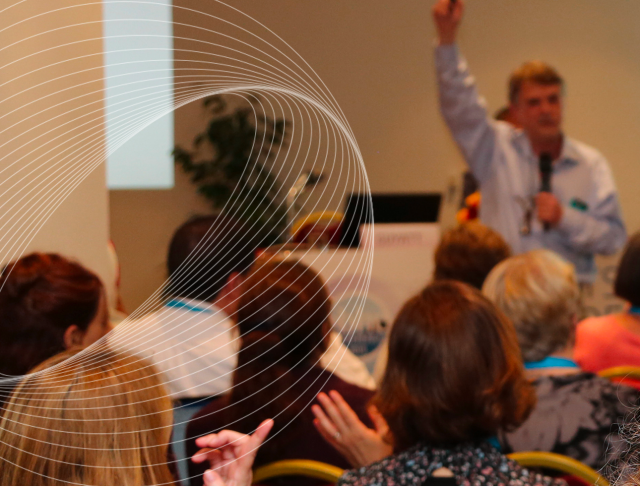-
50
-
Places
Background
The GRADE approach to grading evidence and recommendations has been adopted by over 100 organizations worldwide. Much of GRADE’s work is focusing on improving the process and transparency of making health care decisions.
Aims
To learn from leaders of the GRADE working group in an interactive format about new developments of the GRADE working group that is attractive to newcomers and experienced users of GRADE.
Program
New developments in GRADE, e.g. imprecision and inconsistency rating, integration of non-randomized studies and the use of decision thresholds as well as GRADE adolopment (an efficient and established way to contextualize guidelines including adaptation) will be covered.
All of that will based on new GRADE guidance that will be finalized in 2023 and achieved through GRADE Evidence to Decision Frameworks Simulation: Making health care recommendations. Understand the key criteria when moving from evidence to recommendations including certainty in the evidence, resource implications, equity, feasibility, values and preferences.
The program will include an interactive introduction followed by a simulation that will help learners apply the learned content in practical learning exercises.
25 th October 2023 • 2.30 PM 
Improving the E in the Ecosystem of Evidence: the Oxford CEBM catalogue of bias
Background
In his 1979 paper on Biases in Analytical Research, Dave Sackett brought to our collective attention the importance of bias in research. Published in the Journal of Chronic Diseases, he reported the first draft of a ‘catalog of biases which may distort the design, execution, analysis, and interpretation of research.’ Sackett catalogued 35 biases that arise in sampling and measurement, in the context of clinical trials, and listed 56 biases potentially affecting case-control and cohort studies. He proposed the continued development of an annotated catalogue of bias as a priority for research. At the time of his death in 2015, no one hand taken up David’s charge. The Catalogue of Bias (CoB) collaboration is, therefore, taking forward the task of creating a Catalogue of Bias in memory of David’s work.
Aims
- To provide a short history of bias in health research
- To introduce delegates to the Oxford CEBM catalogue of bias
- To provide delegates the opportunity to lead on/contribute to writing an entry in the catalogue on a bias of their choice
Program
- Participants will enjoy a presentation of a brief history of bias in health research, including examples from the literature, efforts to understand its role, and control/prevent its impact
- This will be followed by a brief introduction to the catalogue of bias, detailing the methods as to how entries for selected biases are created
- Participants will then be divided into groups of 4 and asked to select (from a list of biases or offer one of their own choosing that is not currently featured in the CoB) a bias to take forward and work together to create as an entry in the CoB
- Participants will create content live on a shared document. They will be provided resources and support to identify relevant content
- Participants will share each other’s work for discussion before ending the meeting with a summary of the next steps and follow up
26 th October 2023 - 4.45 PM 
Global models of partner engagement to rapidly implement evidence-based practice
-
20
-
Places
Background
Evidence-based implementation has previously been seen as a technical improvement practice but in the sustainable development goals, healthcare is entangled with economic, social, technological, and environmental factors. Varied contexts and settings require an appreciation of the complex interplay of multiple actors: knowledge users, stakeholders, researchers, and those supporting the implementation process. The fundamental goal of implementation science is therefore to integrate research and practice in ways that improve the outcomes of those being served with research seeking to understand and evaluate different approaches. Really good interdisciplinary implementation requires a sincere commitment to participatory co-production and this discussion will enable a reflection on several ways that implementation is being undertaken through partnership.
A facilitated discussion will aim to identify critical challenges to developing and sustaining partnerships with the goal of achieving implementation in practice.
Aims
To evaluate the challenges associated with strategic partner engagement with examples from Australia and UK. The focused discussion will address critical challenges to implementation of new ways of working in healthcare.
Program
Short presentations will provide examples of different models of partnerships created to enable implementation.
- ‘Research in residence’ supporting implementation in an NHS Trust
- ARCH (Academic and Research Collaborative in Health) as an organisational partnership implementing falls improvement
- Community and Voluntary Sector (CVS) partnership for impact evaluation
- Undergraduate students as partners in adoption of ‘digital enhanced’ methods
- ”Not reinventing the wheel’: Partnering with existing health service quality processes to translate evidence from clinical practice guidelines into practice
26 th October 2023 - 4.45 PM 
Network meta-analysis: the basics, certainty of evidence and interpretation using GRADE
-
50
-
Places
Background
Network meta-analysis remains a relatively new, but now essential feature of evidence-based medicine. The GRADE approach to NMA even newer, and continues to evolve, with a major innovation in GRADE interpretation in 2020.
Aims
To provide attendees with an excellent understanding of the basics of NMA, the GRADE approach to rating certainty of evidence in NMA, and the GRADE approach to interpreting results of NMA.
Program
Format will be an interactive lecture with a series of brief exercises that participants will undertake in small groups that will facilitate subsequent discussion. The material covered will include an understanding of the nature of indirect comparisons and the associated concept of transitivity; how NMA combines direct and indirect comparisons; how GRADE rates the certainty of evidence of indirect comparisons; the available approaches to ranking and their limitations; and GRADE’s recently developed approach to interpreting NMAs with large number of interventions (nodes).
26 th October 2023 - 4.45 PM 
Promoting Equality, Diversity, and Inclusion in Academic Publishing
Background
In recent year, there has been an increasing debate on how scientific journals represent sex, gender, ethnicity and other aspects of human diversity. Moreover, the hegemony of the English language in scientific publications lays the foundation for structural inequalities for non-native speakers. As a result, there is a call to authors, editor, and reviewers to ask themselves: How can we minimise our biases and be more inclusive?
Aims
- To debate the main emerging challenges in diversity and academic publishing
- To analyse the role of language when discussing sex, gender, and ethnicity, among other topics, in scientific communications
- To identify strategies to acknowledge diversity a the different stages of the publishing process
Program
- Initiatives for Equality. Diversity and Inclusion (EDI)
- Current guidelines on sex, gender and ethnicity
- Diversity in research teams and the context of research
- Common problems related to language when submitting, reviewing and editing a manuscript
Based on the discussion of real-life anonymised cases from the BMJ and the input of the participants, this workshop aims to promote debate and analysis on this topic while thinking of possible solutions to some of the emerging challenges in this area. In addition, we will collect and summarise the participants' input into themes that will be disseminated in further communications.
26 th October 2023 - 4.45 PM 
Pragmatic trials and randomized real world evidence on non-pharmaceutical interventions: challenges and solutions in conduct and assessment
-
40
-
Places
Background
Pragmatic trials offer direct evidence to inform decisions. Randomization is probably the key element to make routinely collected health data (RCD) most useful for evidence based health care. RCD can help to rapidly generate pragmatic trials that provide randomized real world evidence at low costs. The conduct and assessment of pragmatic trials faces various general challenges, and special challenges exist for trials investigating non-pharmaceutical interventions.
Aims
- To discuss promises, opportunities and challenges of using RCD for conducting RCTs
- To discuss special challenges and solutions in conduct and assessment of pragmatic trials assessing non-pharmaceutical interventions
- To spread the understanding of the potential of this evidence and ignite collaborative research activities
Program
This interactive session invites researchers, decision-makers, regulators and other interested stakeholders. We will present theoretical frameworks, show practical examples, and discuss empirical research on the validity and reliability of using RCD for pragmatic RCTs on non- pharmaceutical interventions.
We aim to interactively outline promises, opportunities and challenges of this way of evidence generation.
27 th October 2023 - 4.45 PM 
Creating, publishing and dynamically updating trustworthy and living guidelines through MAGIC
-
50
-
Places
Background
The living guidelines model has been successfully used by a number of organisations in topic areas such as COVID-19, diabetes, stroke and musculoskeletal conditions. They have shown that it is possible to efficiently provide living guidance, which is kept continually up-to-date with new evidence, without compromising quality. These rigorous, up-to-date guidelines improve health decision-making by increasing transparency and reducing the opportunity for opinion to fill the evidence-based guidance gap created by out of date guidelines. The living approach – making use of best current standards, methods, processes and tools - provides an opportunity for a new era of guideline development by making reliable, trustworthy, up to date information accessible to consumers and professionals without undue delays. Platforms with digitally structured data such as MAGICapp is critical for efficient production, dissemination and dynamic updating of living recommendations. Hands on knowledge about such a platform makes it easier to understand and ideally make the leap to living guidance.
Aims
- Understand the concept of living guidelines and how they differ from traditional guidelines
- Through the use of MAGICapp, understand the practical steps required to successfully use a living approach to guideline development, publication and dynamic updating
Program
- Introduction: living guidelines in an enhanced evidence ecosystem
- Guideline panel simulation: updating and publishing a recommendation in MAGICapp, based on hot off-the-press practice changing evidence
- Plenary discussion: Challenges and opportunities for those interested in moving to living evidence and guidance
27 th October 2023 - 4.45 PM 
Teaching EBHC in an online environment: Moving from theory to practice
-
20
-
Places
Background
A recent update of an overview of systematic reviews on the effects of teaching evidence-based health care (EBHC) concluded that “EBHC teaching and learning should be interactive, multifaceted, integrated into clinical practice, and should include assessments.” Putting this into practice is not straight forward, especially if learning occurs in a virtual environment. During the Covid-19 pandemic, there was a massive shift from in-person to virtual training, and we mostly had to adopt the learning-by-doing approach when using various technologies. There is no guide on which tools to use and how to use them when teaching EBHC, but we have learned a lot and gathered vast amounts of experience during these past three years. During this workshop, we therefore propose that we share what we have learned and start brainstorming on the best technologies to use when teaching EBHC with the ultimate goal of a joint publication post-conference
Aims
- To recap the theory of effective EBHC teaching
- To share experiences of teaching EBHC in a virtual environment
- To discuss advantages and disadvantages with various technological tools
- To jointly come up with a list of the five most useful tools to teach EBHC in a virtual environment
Program
- Welcome and introduction
- Recap of what we know about effective teaching of EBHC
- Small group discussions – sharing experiences of using various tools
- Feedback from groups
- Finalising the list of top 5 tools
- Closure and next steps
27 th October 2023 - 4.45 PM 
The Importance of End-User Perspectives in Reducing Research Waste
-
25
-
Places
Background
For health research to be relevant, it should meet the needs and demands of the end users, especially patients. The evidence-based research (EBR) approach suggests using a systematic and transparent approach to incorporate the perspective of end users in planning new research and placing the research results in context.
Aims
A European Union COST Action (network building grant) called EVBRES (Evidence-Based RESearch) was established in 2018 to establish an international European-based network to raise awareness about EBR. During the course of implementing EVBRES, opportunities and challenges to using an EBR approach to identifying and incorporating end-users' perspectives have been realised. This workshop aims to interactively explore with attendees solutions to incorporating end-user perspectives in research and initiate the development of communication (e.g., white paper, position statement) for broader dissemination within the research community.
Program
There will be two short presentations with time for questions and answers, one providing an overview of EBR situated within the Produced Evidence component of the Evidence Ecosystem and another focusing on incorporating end users’ perspectives when planning, performing and disseminating health research. The majority and remainder of the workshop will be dedicated to 3 facilitated, small-group and summary large-group discussions about existing and new solutions to incorporating end-user perspectives in a) the justification of new research, b) the methodological design of new research, and c) the contextualisation of the results of new research. The workshop will conclude with the identification of a timeline of deliverables for drafting, finalising, and disseminating communication of “best practices” to incorporate end-users’ perspectives in the new research.



































